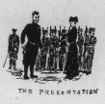|
|
 IT
is the day of the annual "compet." In the Armory
each company is drawn up; the accouterments of each
man carefully inspected; every speck of dust sought
out and removed; a last rub given each shining gun.
The captains draw their number of appearance upon
the field. The word is given; out of the hall they
march to various parts of the campus, there to
await their turn. IT
is the day of the annual "compet." In the Armory
each company is drawn up; the accouterments of each
man carefully inspected; every speck of dust sought
out and removed; a last rub given each shining gun.
The captains draw their number of appearance upon
the field. The word is given; out of the hall they
march to various parts of the campus, there to
await their turn.
The captain paces nervously
before his men, who watch him closely and wonder
whether he can successfully carry out his part. The
men themselves scarcely speak; each is saying to
himself that HE will do his best to make his
company the proud possessor of the silver cup; each
is going over in his mind the various evolutions
and commands, to see if he knows and understands
them perfectly.
A girl comes down the walk
towards them. She takes a sword from the lieutenant
and steps in front of the company. She is the
company sponsor; the captain, now blushing and
nervous, comes forward and takes from her the sword
which the men have given him as a token of their
loyalty and admiration. There is a cheer for the
sponsor, for the captain, and for the company and
then an orderly comes hurrying up with orders to go
upon the field.
The march is silent, almost grim,
as if they are going into a real battle in place of
a competition. They go down the walk and through
the gate of the athletic field, to halt beside
the
|
judges' tents; then across the field toward the
sea of faces in the grandstand. The captain hurries
forward, salutes, and receives from the judges the
card upon which is the list of evolutions through
which his company must go. He studies them for a
few moments; he gives the command "Forward, March,"
and the ordeal has begun.
"Right by Platoons." The
lieutenants hurry forward before their respective
detachments. Will they do it right? or will some
one make a mistake? The second lieutenant gives his
command too soon. The line sways, some trying to
correct the mistake by holding back, others
following the order blindly. How much will the
judges count off the score? Did they, perhaps, fail
to notice the error? All kinds of thoughts surge
through the minds of the student soldiers, to whom
winning means so much. But a moment later another
command comes and the line straightens as the
movement is executed faultlessly. Confidence again
appears, and each one vows to make up for that
initial mistake. All goes smoothly for a while, and
then a corporal forgets his orders. Again the line
is in disorder only to compose itself for the next
effort. At last the final command is given and
their part is over.
They march to one side of the
field, stack arms, and break ranks to ask the other
companies how they did, or to watch and criticise
the evolutions of the next contestants. For the
first time they pay attention to the crowd filling
the grandstand. There are the fair adherents of the
various companies, or the friends and relatives who
have come to see the show. About the track
|
|





